COVID-19 Pandemic: Impact on Vietnamese University Student Behaviors
VerifiedAdded on 2021/09/18
|7
|2745
|306
Report
AI Summary
This report presents a dataset and analysis of the impact of the COVID-19 pandemic on the perceptions and behaviors of university students in Vietnam. The study, conducted through online surveys using platforms like Facebook and Google Forms, collected 440 valid responses. The questionnaire explored students' sensitivity to the crisis in making daily decisions, including work/study habits and travel plans. The data, collected between March 16 and March 22, 2020, reveals significant changes in students' attitudes toward work, study, and travel. The research employed descriptive statistics and exploratory factor analysis, identifying key factors influencing student behaviors. The findings indicate shifts in preferences for online activities, reduced travel intentions, and concerns about public spaces. The data set includes demographic information and detailed responses to questions regarding the pandemic's impact on various aspects of students' lives. The report provides valuable insights for the tourism industry and other sectors seeking to understand consumer behavior during and after public health crises.
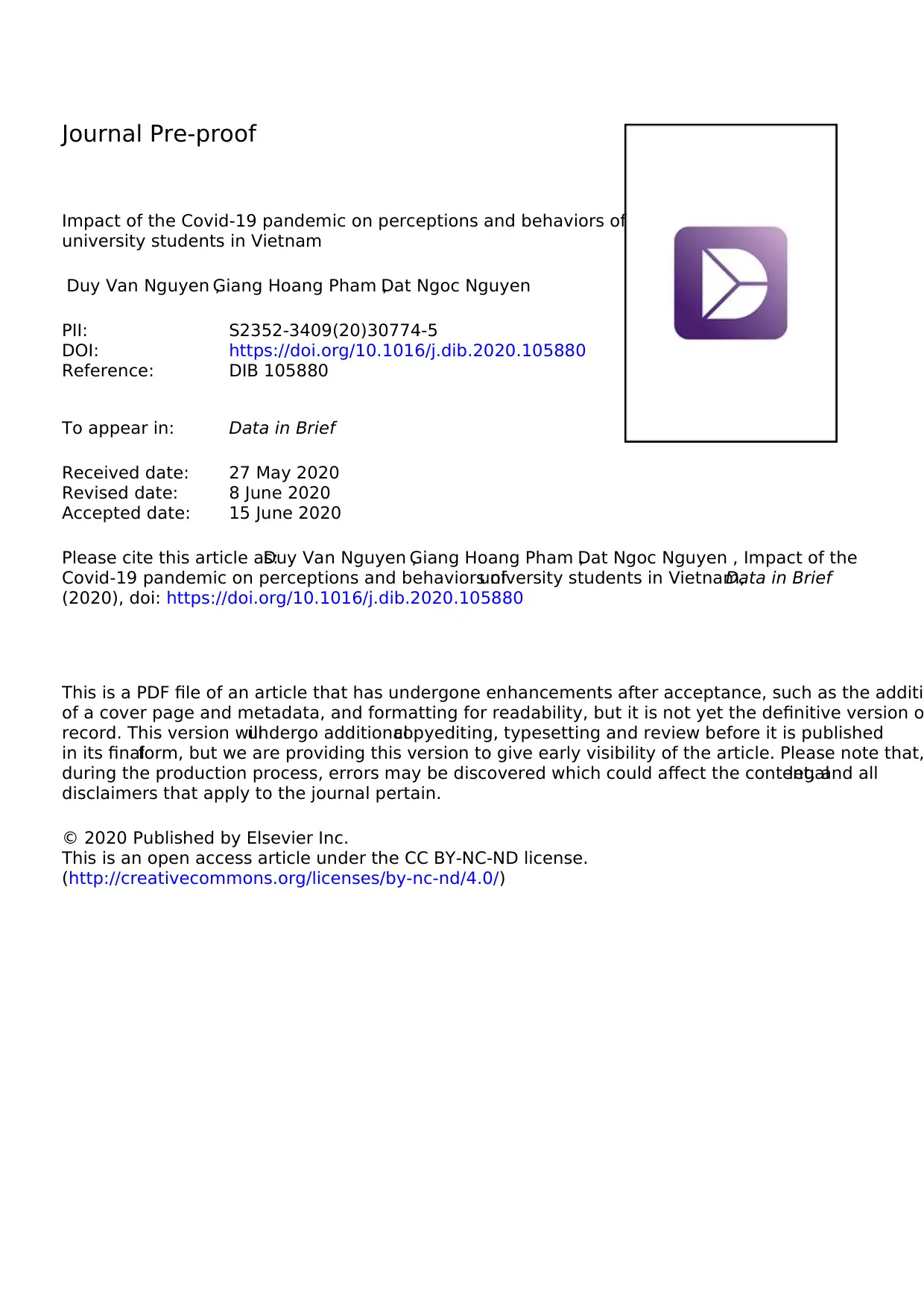
Journal Pre-proof
Impact of the Covid-19 pandemic on perceptions and behaviors of
university students in Vietnam
Duy Van Nguyen ,Giang Hoang Pham ,Dat Ngoc Nguyen
PII: S2352-3409(20)30774-5
DOI: https://doi.org/10.1016/j.dib.2020.105880
Reference: DIB 105880
To appear in: Data in Brief
Received date: 27 May 2020
Revised date: 8 June 2020
Accepted date: 15 June 2020
Please cite this article as:Duy Van Nguyen ,Giang Hoang Pham ,Dat Ngoc Nguyen , Impact of the
Covid-19 pandemic on perceptions and behaviors ofuniversity students in Vietnam,Data in Brief
(2020), doi: https://doi.org/10.1016/j.dib.2020.105880
This is a PDF file of an article that has undergone enhancements after acceptance, such as the additio
of a cover page and metadata, and formatting for readability, but it is not yet the definitive version o
record. This version willundergo additionalcopyediting, typesetting and review before it is published
in its finalform, but we are providing this version to give early visibility of the article. Please note that,
during the production process, errors may be discovered which could affect the content, and alllegal
disclaimers that apply to the journal pertain.
© 2020 Published by Elsevier Inc.
This is an open access article under the CC BY-NC-ND license.
(http://creativecommons.org/licenses/by-nc-nd/4.0/)
Impact of the Covid-19 pandemic on perceptions and behaviors of
university students in Vietnam
Duy Van Nguyen ,Giang Hoang Pham ,Dat Ngoc Nguyen
PII: S2352-3409(20)30774-5
DOI: https://doi.org/10.1016/j.dib.2020.105880
Reference: DIB 105880
To appear in: Data in Brief
Received date: 27 May 2020
Revised date: 8 June 2020
Accepted date: 15 June 2020
Please cite this article as:Duy Van Nguyen ,Giang Hoang Pham ,Dat Ngoc Nguyen , Impact of the
Covid-19 pandemic on perceptions and behaviors ofuniversity students in Vietnam,Data in Brief
(2020), doi: https://doi.org/10.1016/j.dib.2020.105880
This is a PDF file of an article that has undergone enhancements after acceptance, such as the additio
of a cover page and metadata, and formatting for readability, but it is not yet the definitive version o
record. This version willundergo additionalcopyediting, typesetting and review before it is published
in its finalform, but we are providing this version to give early visibility of the article. Please note that,
during the production process, errors may be discovered which could affect the content, and alllegal
disclaimers that apply to the journal pertain.
© 2020 Published by Elsevier Inc.
This is an open access article under the CC BY-NC-ND license.
(http://creativecommons.org/licenses/by-nc-nd/4.0/)
Paraphrase This Document
Need a fresh take? Get an instant paraphrase of this document with our AI Paraphraser
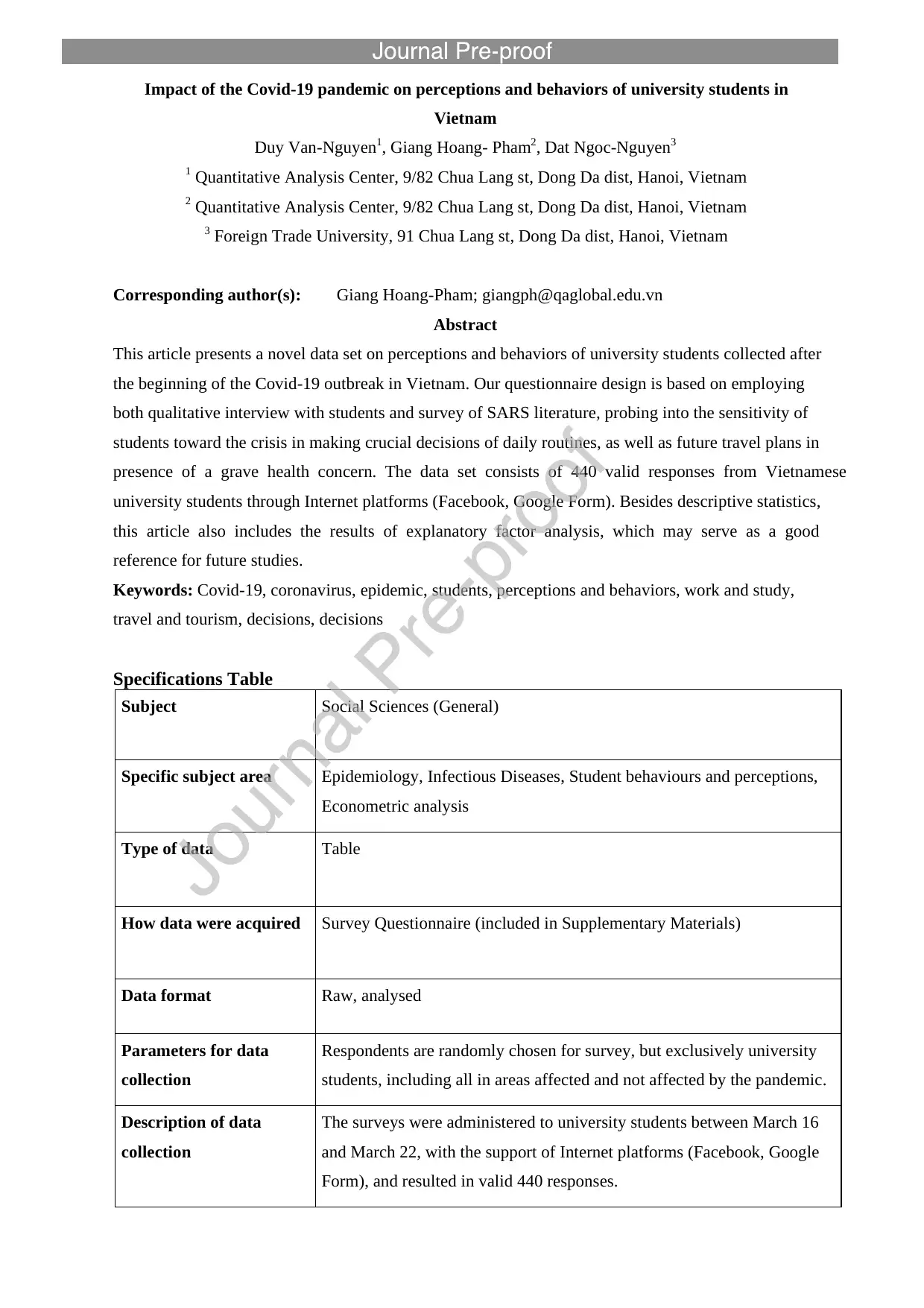
Impact of the Covid-19 pandemic on perceptions and behaviors of university students in
Vietnam
Duy Van-Nguyen1, Giang Hoang- Pham2, Dat Ngoc-Nguyen3
1 Quantitative Analysis Center, 9/82 Chua Lang st, Dong Da dist, Hanoi, Vietnam
2 Quantitative Analysis Center, 9/82 Chua Lang st, Dong Da dist, Hanoi, Vietnam
3 Foreign Trade University, 91 Chua Lang st, Dong Da dist, Hanoi, Vietnam
Corresponding author(s): Giang Hoang-Pham; giangph@qaglobal.edu.vn
Abstract
This article presents a novel data set on perceptions and behaviors of university students collected after
the beginning of the Covid-19 outbreak in Vietnam. Our questionnaire design is based on employing
both qualitative interview with students and survey of SARS literature, probing into the sensitivity of
students toward the crisis in making crucial decisions of daily routines, as well as future travel plans in
presence of a grave health concern. The data set consists of 440 valid responses from Vietnamese
university students through Internet platforms (Facebook, Google Form). Besides descriptive statistics,
this article also includes the results of explanatory factor analysis, which may serve as a good
reference for future studies.
Keywords: Covid-19, coronavirus, epidemic, students, perceptions and behaviors, work and study,
travel and tourism, decisions, decisions
Specifications Table
Subject Social Sciences (General)
Specific subject area Epidemiology, Infectious Diseases, Student behaviours and perceptions,
Econometric analysis
Type of data Table
How data were acquired Survey Questionnaire (included in Supplementary Materials)
Data format Raw, analysed
Parameters for data
collection
Respondents are randomly chosen for survey, but exclusively university
students, including all in areas affected and not affected by the pandemic.
Description of data
collection
The surveys were administered to university students between March 16
and March 22, with the support of Internet platforms (Facebook, Google
Form), and resulted in valid 440 responses.
Vietnam
Duy Van-Nguyen1, Giang Hoang- Pham2, Dat Ngoc-Nguyen3
1 Quantitative Analysis Center, 9/82 Chua Lang st, Dong Da dist, Hanoi, Vietnam
2 Quantitative Analysis Center, 9/82 Chua Lang st, Dong Da dist, Hanoi, Vietnam
3 Foreign Trade University, 91 Chua Lang st, Dong Da dist, Hanoi, Vietnam
Corresponding author(s): Giang Hoang-Pham; giangph@qaglobal.edu.vn
Abstract
This article presents a novel data set on perceptions and behaviors of university students collected after
the beginning of the Covid-19 outbreak in Vietnam. Our questionnaire design is based on employing
both qualitative interview with students and survey of SARS literature, probing into the sensitivity of
students toward the crisis in making crucial decisions of daily routines, as well as future travel plans in
presence of a grave health concern. The data set consists of 440 valid responses from Vietnamese
university students through Internet platforms (Facebook, Google Form). Besides descriptive statistics,
this article also includes the results of explanatory factor analysis, which may serve as a good
reference for future studies.
Keywords: Covid-19, coronavirus, epidemic, students, perceptions and behaviors, work and study,
travel and tourism, decisions, decisions
Specifications Table
Subject Social Sciences (General)
Specific subject area Epidemiology, Infectious Diseases, Student behaviours and perceptions,
Econometric analysis
Type of data Table
How data were acquired Survey Questionnaire (included in Supplementary Materials)
Data format Raw, analysed
Parameters for data
collection
Respondents are randomly chosen for survey, but exclusively university
students, including all in areas affected and not affected by the pandemic.
Description of data
collection
The surveys were administered to university students between March 16
and March 22, with the support of Internet platforms (Facebook, Google
Form), and resulted in valid 440 responses.
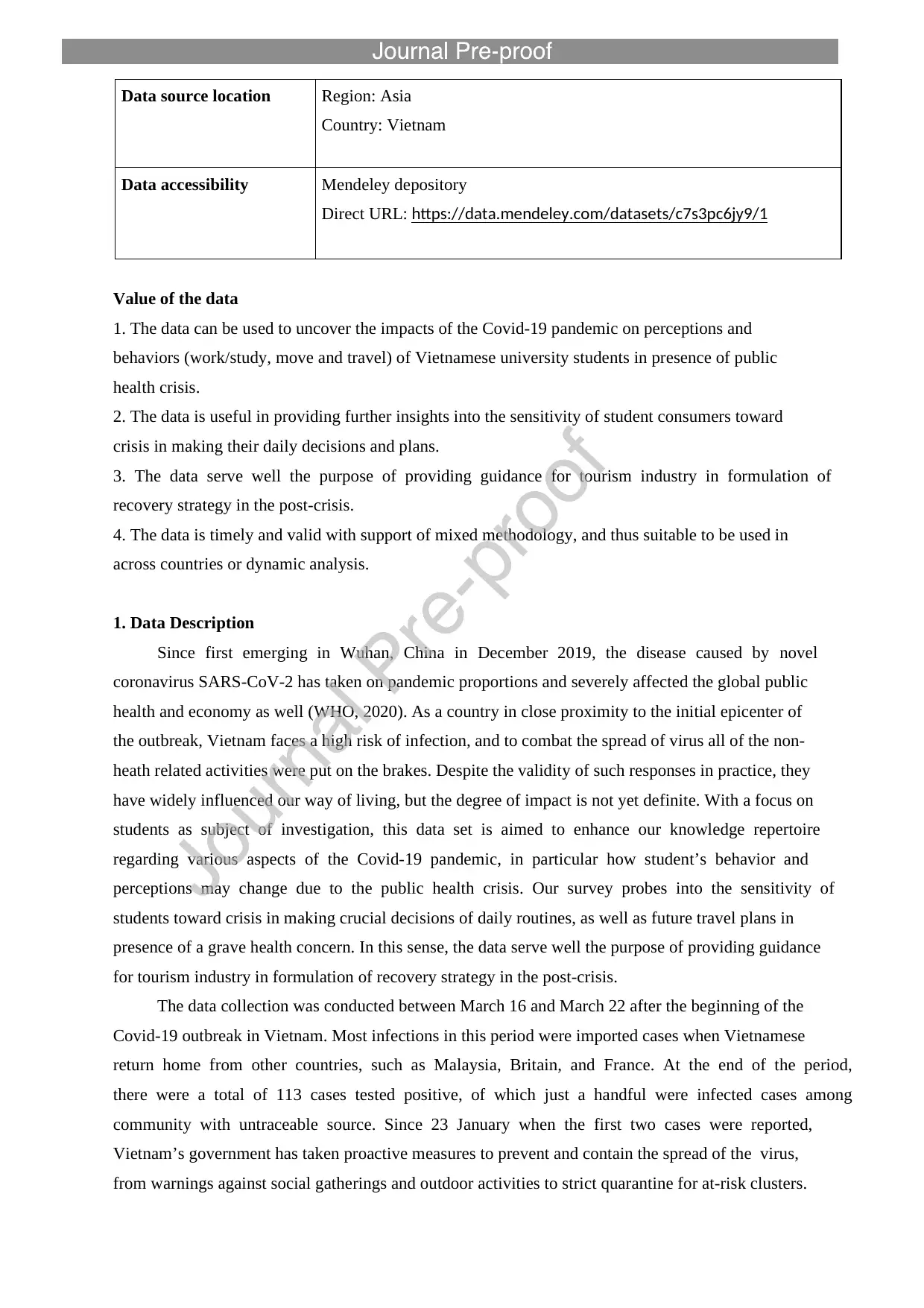
Data source location Region: Asia
Country: Vietnam
Data accessibility Mendeley depository
Direct URL: https://data.mendeley.com/datasets/c7s3pc6jy9/1
Value of the data
1. The data can be used to uncover the impacts of the Covid-19 pandemic on perceptions and
behaviors (work/study, move and travel) of Vietnamese university students in presence of public
health crisis.
2. The data is useful in providing further insights into the sensitivity of student consumers toward
crisis in making their daily decisions and plans.
3. The data serve well the purpose of providing guidance for tourism industry in formulation of
recovery strategy in the post-crisis.
4. The data is timely and valid with support of mixed methodology, and thus suitable to be used in
across countries or dynamic analysis.
1. Data Description
Since first emerging in Wuhan, China in December 2019, the disease caused by novel
coronavirus SARS-CoV-2 has taken on pandemic proportions and severely affected the global public
health and economy as well (WHO, 2020). As a country in close proximity to the initial epicenter of
the outbreak, Vietnam faces a high risk of infection, and to combat the spread of virus all of the non-
heath related activities were put on the brakes. Despite the validity of such responses in practice, they
have widely influenced our way of living, but the degree of impact is not yet definite. With a focus on
students as subject of investigation, this data set is aimed to enhance our knowledge repertoire
regarding various aspects of the Covid-19 pandemic, in particular how student’s behavior and
perceptions may change due to the public health crisis. Our survey probes into the sensitivity of
students toward crisis in making crucial decisions of daily routines, as well as future travel plans in
presence of a grave health concern. In this sense, the data serve well the purpose of providing guidance
for tourism industry in formulation of recovery strategy in the post-crisis.
The data collection was conducted between March 16 and March 22 after the beginning of the
Covid-19 outbreak in Vietnam. Most infections in this period were imported cases when Vietnamese
return home from other countries, such as Malaysia, Britain, and France. At the end of the period,
there were a total of 113 cases tested positive, of which just a handful were infected cases among
community with untraceable source. Since 23 January when the first two cases were reported,
Vietnam’s government has taken proactive measures to prevent and contain the spread of the virus,
from warnings against social gatherings and outdoor activities to strict quarantine for at-risk clusters.
Country: Vietnam
Data accessibility Mendeley depository
Direct URL: https://data.mendeley.com/datasets/c7s3pc6jy9/1
Value of the data
1. The data can be used to uncover the impacts of the Covid-19 pandemic on perceptions and
behaviors (work/study, move and travel) of Vietnamese university students in presence of public
health crisis.
2. The data is useful in providing further insights into the sensitivity of student consumers toward
crisis in making their daily decisions and plans.
3. The data serve well the purpose of providing guidance for tourism industry in formulation of
recovery strategy in the post-crisis.
4. The data is timely and valid with support of mixed methodology, and thus suitable to be used in
across countries or dynamic analysis.
1. Data Description
Since first emerging in Wuhan, China in December 2019, the disease caused by novel
coronavirus SARS-CoV-2 has taken on pandemic proportions and severely affected the global public
health and economy as well (WHO, 2020). As a country in close proximity to the initial epicenter of
the outbreak, Vietnam faces a high risk of infection, and to combat the spread of virus all of the non-
heath related activities were put on the brakes. Despite the validity of such responses in practice, they
have widely influenced our way of living, but the degree of impact is not yet definite. With a focus on
students as subject of investigation, this data set is aimed to enhance our knowledge repertoire
regarding various aspects of the Covid-19 pandemic, in particular how student’s behavior and
perceptions may change due to the public health crisis. Our survey probes into the sensitivity of
students toward crisis in making crucial decisions of daily routines, as well as future travel plans in
presence of a grave health concern. In this sense, the data serve well the purpose of providing guidance
for tourism industry in formulation of recovery strategy in the post-crisis.
The data collection was conducted between March 16 and March 22 after the beginning of the
Covid-19 outbreak in Vietnam. Most infections in this period were imported cases when Vietnamese
return home from other countries, such as Malaysia, Britain, and France. At the end of the period,
there were a total of 113 cases tested positive, of which just a handful were infected cases among
community with untraceable source. Since 23 January when the first two cases were reported,
Vietnam’s government has taken proactive measures to prevent and contain the spread of the virus,
from warnings against social gatherings and outdoor activities to strict quarantine for at-risk clusters.
⊘ This is a preview!⊘
Do you want full access?
Subscribe today to unlock all pages.

Trusted by 1+ million students worldwide
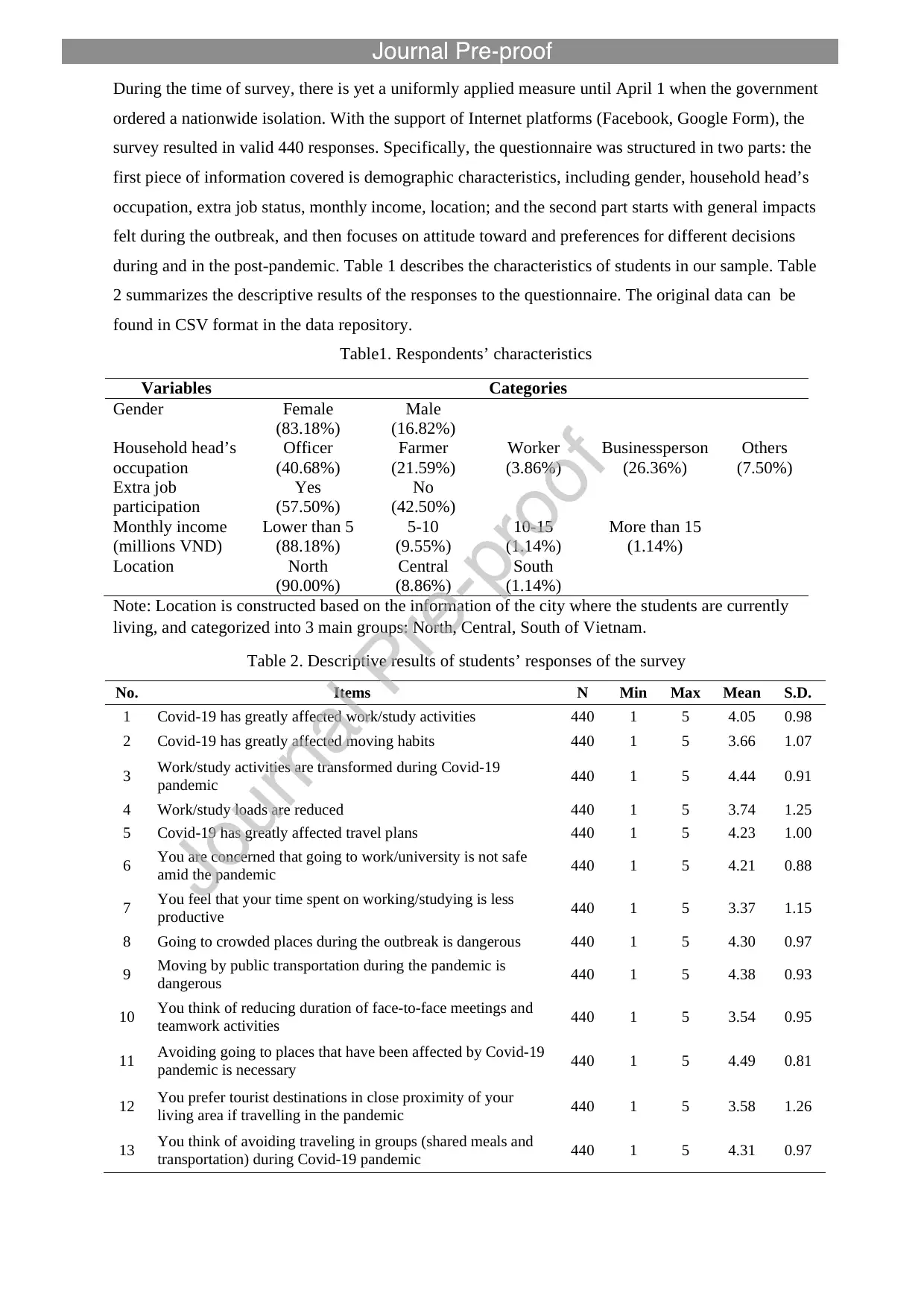
During the time of survey, there is yet a uniformly applied measure until April 1 when the government
ordered a nationwide isolation. With the support of Internet platforms (Facebook, Google Form), the
survey resulted in valid 440 responses. Specifically, the questionnaire was structured in two parts: the
first piece of information covered is demographic characteristics, including gender, household head’s
occupation, extra job status, monthly income, location; and the second part starts with general impacts
felt during the outbreak, and then focuses on attitude toward and preferences for different decisions
during and in the post-pandemic. Table 1 describes the characteristics of students in our sample. Table
2 summarizes the descriptive results of the responses to the questionnaire. The original data can be
found in CSV format in the data repository.
Table1. Respondents’ characteristics
Variables Categories
Gender Female
(83.18%)
Male
(16.82%)
Household head’s
occupation
Officer
(40.68%)
Farmer
(21.59%)
Worker
(3.86%)
Businessperson
(26.36%)
Others
(7.50%)
Extra job
participation
Yes
(57.50%)
No
(42.50%)
Monthly income
(millions VND)
Lower than 5
(88.18%)
5-10
(9.55%)
10-15
(1.14%)
More than 15
(1.14%)
Location North
(90.00%)
Central
(8.86%)
South
(1.14%)
Note: Location is constructed based on the information of the city where the students are currently
living, and categorized into 3 main groups: North, Central, South of Vietnam.
Table 2. Descriptive results of students’ responses of the survey
No. Items N Min Max Mean S.D.
1 Covid-19 has greatly affected work/study activities 440 1 5 4.05 0.98
2 Covid-19 has greatly affected moving habits 440 1 5 3.66 1.07
3 Work/study activities are transformed during Covid-19
pandemic 440 1 5 4.44 0.91
4 Work/study loads are reduced 440 1 5 3.74 1.25
5 Covid-19 has greatly affected travel plans 440 1 5 4.23 1.00
6 You are concerned that going to work/university is not safe
amid the pandemic 440 1 5 4.21 0.88
7 You feel that your time spent on working/studying is less
productive 440 1 5 3.37 1.15
8 Going to crowded places during the outbreak is dangerous 440 1 5 4.30 0.97
9 Moving by public transportation during the pandemic is
dangerous 440 1 5 4.38 0.93
10 You think of reducing duration of face-to-face meetings and
teamwork activities 440 1 5 3.54 0.95
11 Avoiding going to places that have been affected by Covid-19
pandemic is necessary 440 1 5 4.49 0.81
12 You prefer tourist destinations in close proximity of your
living area if travelling in the pandemic 440 1 5 3.58 1.26
13 You think of avoiding traveling in groups (shared meals and
transportation) during Covid-19 pandemic 440 1 5 4.31 0.97
ordered a nationwide isolation. With the support of Internet platforms (Facebook, Google Form), the
survey resulted in valid 440 responses. Specifically, the questionnaire was structured in two parts: the
first piece of information covered is demographic characteristics, including gender, household head’s
occupation, extra job status, monthly income, location; and the second part starts with general impacts
felt during the outbreak, and then focuses on attitude toward and preferences for different decisions
during and in the post-pandemic. Table 1 describes the characteristics of students in our sample. Table
2 summarizes the descriptive results of the responses to the questionnaire. The original data can be
found in CSV format in the data repository.
Table1. Respondents’ characteristics
Variables Categories
Gender Female
(83.18%)
Male
(16.82%)
Household head’s
occupation
Officer
(40.68%)
Farmer
(21.59%)
Worker
(3.86%)
Businessperson
(26.36%)
Others
(7.50%)
Extra job
participation
Yes
(57.50%)
No
(42.50%)
Monthly income
(millions VND)
Lower than 5
(88.18%)
5-10
(9.55%)
10-15
(1.14%)
More than 15
(1.14%)
Location North
(90.00%)
Central
(8.86%)
South
(1.14%)
Note: Location is constructed based on the information of the city where the students are currently
living, and categorized into 3 main groups: North, Central, South of Vietnam.
Table 2. Descriptive results of students’ responses of the survey
No. Items N Min Max Mean S.D.
1 Covid-19 has greatly affected work/study activities 440 1 5 4.05 0.98
2 Covid-19 has greatly affected moving habits 440 1 5 3.66 1.07
3 Work/study activities are transformed during Covid-19
pandemic 440 1 5 4.44 0.91
4 Work/study loads are reduced 440 1 5 3.74 1.25
5 Covid-19 has greatly affected travel plans 440 1 5 4.23 1.00
6 You are concerned that going to work/university is not safe
amid the pandemic 440 1 5 4.21 0.88
7 You feel that your time spent on working/studying is less
productive 440 1 5 3.37 1.15
8 Going to crowded places during the outbreak is dangerous 440 1 5 4.30 0.97
9 Moving by public transportation during the pandemic is
dangerous 440 1 5 4.38 0.93
10 You think of reducing duration of face-to-face meetings and
teamwork activities 440 1 5 3.54 0.95
11 Avoiding going to places that have been affected by Covid-19
pandemic is necessary 440 1 5 4.49 0.81
12 You prefer tourist destinations in close proximity of your
living area if travelling in the pandemic 440 1 5 3.58 1.26
13 You think of avoiding traveling in groups (shared meals and
transportation) during Covid-19 pandemic 440 1 5 4.31 0.97
Paraphrase This Document
Need a fresh take? Get an instant paraphrase of this document with our AI Paraphraser
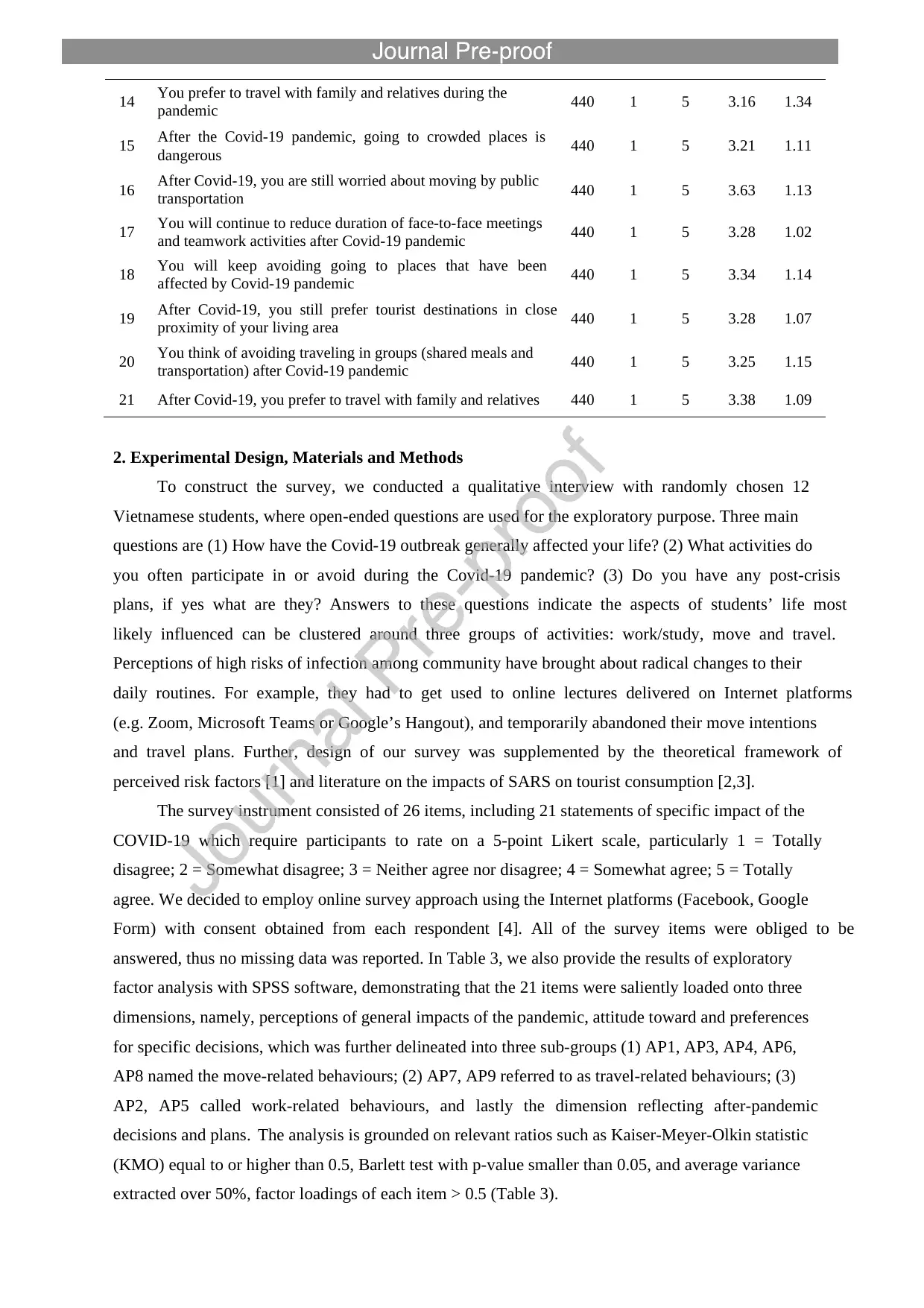
14 You prefer to travel with family and relatives during the
pandemic 440 1 5 3.16 1.34
15 After the Covid-19 pandemic, going to crowded places is
dangerous 440 1 5 3.21 1.11
16 After Covid-19, you are still worried about moving by public
transportation 440 1 5 3.63 1.13
17 You will continue to reduce duration of face-to-face meetings
and teamwork activities after Covid-19 pandemic 440 1 5 3.28 1.02
18 You will keep avoiding going to places that have been
affected by Covid-19 pandemic 440 1 5 3.34 1.14
19 After Covid-19, you still prefer tourist destinations in close
proximity of your living area 440 1 5 3.28 1.07
20 You think of avoiding traveling in groups (shared meals and
transportation) after Covid-19 pandemic 440 1 5 3.25 1.15
21 After Covid-19, you prefer to travel with family and relatives 440 1 5 3.38 1.09
2. Experimental Design, Materials and Methods
To construct the survey, we conducted a qualitative interview with randomly chosen 12
Vietnamese students, where open-ended questions are used for the exploratory purpose. Three main
questions are (1) How have the Covid-19 outbreak generally affected your life? (2) What activities do
you often participate in or avoid during the Covid-19 pandemic? (3) Do you have any post-crisis
plans, if yes what are they? Answers to these questions indicate the aspects of students’ life most
likely influenced can be clustered around three groups of activities: work/study, move and travel.
Perceptions of high risks of infection among community have brought about radical changes to their
daily routines. For example, they had to get used to online lectures delivered on Internet platforms
(e.g. Zoom, Microsoft Teams or Google’s Hangout), and temporarily abandoned their move intentions
and travel plans. Further, design of our survey was supplemented by the theoretical framework of
perceived risk factors [1] and literature on the impacts of SARS on tourist consumption [2,3].
The survey instrument consisted of 26 items, including 21 statements of specific impact of the
COVID-19 which require participants to rate on a 5-point Likert scale, particularly 1 = Totally
disagree; 2 = Somewhat disagree; 3 = Neither agree nor disagree; 4 = Somewhat agree; 5 = Totally
agree. We decided to employ online survey approach using the Internet platforms (Facebook, Google
Form) with consent obtained from each respondent [4]. All of the survey items were obliged to be
answered, thus no missing data was reported. In Table 3, we also provide the results of exploratory
factor analysis with SPSS software, demonstrating that the 21 items were saliently loaded onto three
dimensions, namely, perceptions of general impacts of the pandemic, attitude toward and preferences
for specific decisions, which was further delineated into three sub-groups (1) AP1, AP3, AP4, AP6,
AP8 named the move-related behaviours; (2) AP7, AP9 referred to as travel-related behaviours; (3)
AP2, AP5 called work-related behaviours, and lastly the dimension reflecting after-pandemic
decisions and plans. The analysis is grounded on relevant ratios such as Kaiser-Meyer-Olkin statistic
(KMO) equal to or higher than 0.5, Barlett test with p-value smaller than 0.05, and average variance
extracted over 50%, factor loadings of each item > 0.5 (Table 3).
pandemic 440 1 5 3.16 1.34
15 After the Covid-19 pandemic, going to crowded places is
dangerous 440 1 5 3.21 1.11
16 After Covid-19, you are still worried about moving by public
transportation 440 1 5 3.63 1.13
17 You will continue to reduce duration of face-to-face meetings
and teamwork activities after Covid-19 pandemic 440 1 5 3.28 1.02
18 You will keep avoiding going to places that have been
affected by Covid-19 pandemic 440 1 5 3.34 1.14
19 After Covid-19, you still prefer tourist destinations in close
proximity of your living area 440 1 5 3.28 1.07
20 You think of avoiding traveling in groups (shared meals and
transportation) after Covid-19 pandemic 440 1 5 3.25 1.15
21 After Covid-19, you prefer to travel with family and relatives 440 1 5 3.38 1.09
2. Experimental Design, Materials and Methods
To construct the survey, we conducted a qualitative interview with randomly chosen 12
Vietnamese students, where open-ended questions are used for the exploratory purpose. Three main
questions are (1) How have the Covid-19 outbreak generally affected your life? (2) What activities do
you often participate in or avoid during the Covid-19 pandemic? (3) Do you have any post-crisis
plans, if yes what are they? Answers to these questions indicate the aspects of students’ life most
likely influenced can be clustered around three groups of activities: work/study, move and travel.
Perceptions of high risks of infection among community have brought about radical changes to their
daily routines. For example, they had to get used to online lectures delivered on Internet platforms
(e.g. Zoom, Microsoft Teams or Google’s Hangout), and temporarily abandoned their move intentions
and travel plans. Further, design of our survey was supplemented by the theoretical framework of
perceived risk factors [1] and literature on the impacts of SARS on tourist consumption [2,3].
The survey instrument consisted of 26 items, including 21 statements of specific impact of the
COVID-19 which require participants to rate on a 5-point Likert scale, particularly 1 = Totally
disagree; 2 = Somewhat disagree; 3 = Neither agree nor disagree; 4 = Somewhat agree; 5 = Totally
agree. We decided to employ online survey approach using the Internet platforms (Facebook, Google
Form) with consent obtained from each respondent [4]. All of the survey items were obliged to be
answered, thus no missing data was reported. In Table 3, we also provide the results of exploratory
factor analysis with SPSS software, demonstrating that the 21 items were saliently loaded onto three
dimensions, namely, perceptions of general impacts of the pandemic, attitude toward and preferences
for specific decisions, which was further delineated into three sub-groups (1) AP1, AP3, AP4, AP6,
AP8 named the move-related behaviours; (2) AP7, AP9 referred to as travel-related behaviours; (3)
AP2, AP5 called work-related behaviours, and lastly the dimension reflecting after-pandemic
decisions and plans. The analysis is grounded on relevant ratios such as Kaiser-Meyer-Olkin statistic
(KMO) equal to or higher than 0.5, Barlett test with p-value smaller than 0.05, and average variance
extracted over 50%, factor loadings of each item > 0.5 (Table 3).
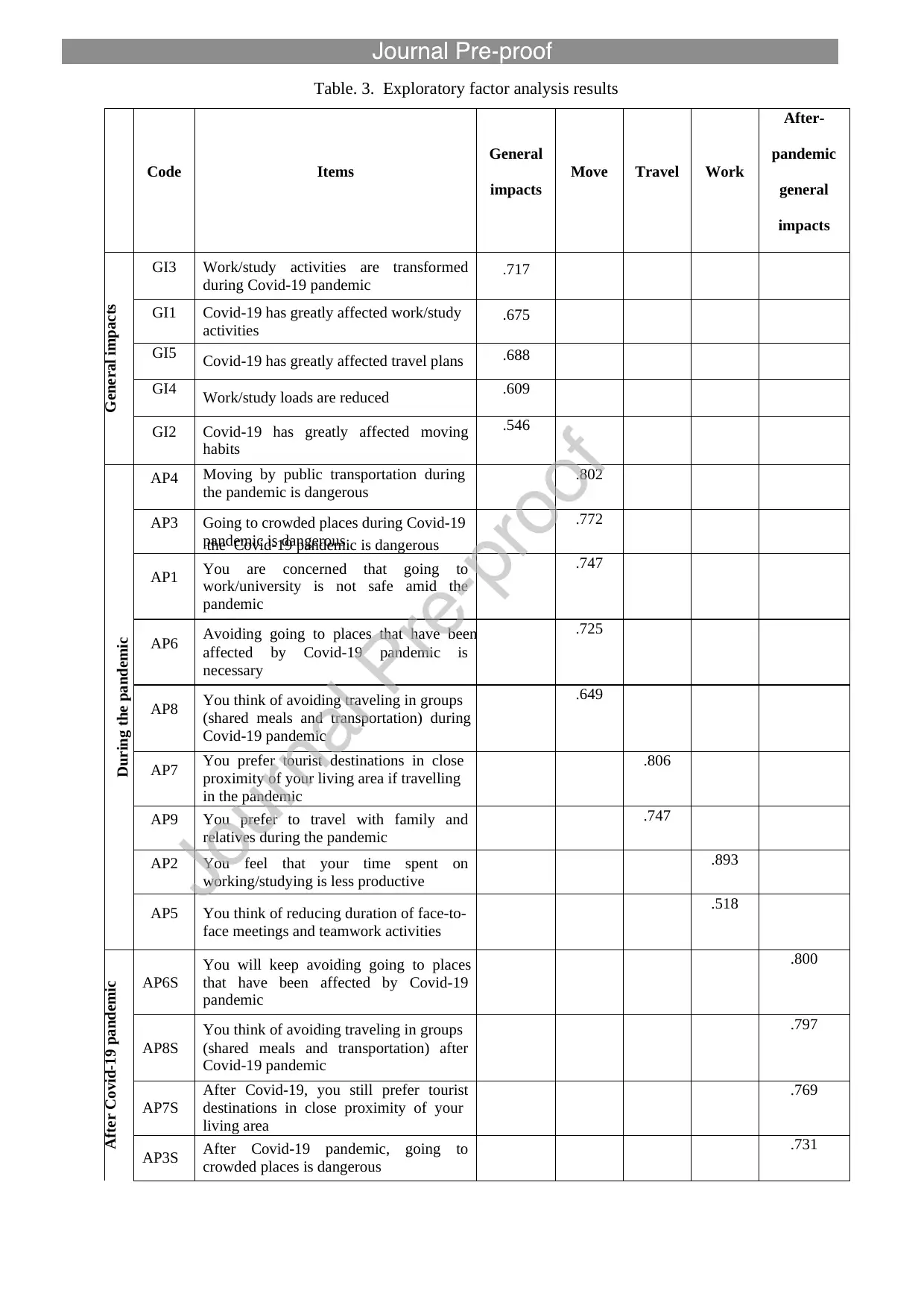
Table. 3. Exploratory factor analysis results
Code Items
General
impacts
Move Travel Work
After-
pandemic
general
impacts
General impacts
GI3 Work/study activities are transformed
during Covid-19 pandemic .717
GI1 Covid-19 has greatly affected work/study
activities .675
GI5 Covid-19 has greatly affected travel plans .688
GI4 Work/study loads are reduced .609
GI2 Covid-19 has greatly affected moving
habits
.546
During the pandemic
AP4 Moving by public transportation during
the pandemic is dangerous
the Covid-19 pandemic is dangerous
.802
AP3 Going to crowded places during Covid-19
pandemic is dangerous
.772
AP1 You are concerned that going to
work/university is not safe amid the
pandemic
.747
AP6 Avoiding going to places that have been
affected by Covid-19 pandemic is
necessary
.725
AP8 You think of avoiding traveling in groups
(shared meals and transportation) during
Covid-19 pandemic
.649
AP7 You prefer tourist destinations in close
proximity of your living area if travelling
in the pandemic
.806
AP9 You prefer to travel with family and
relatives during the pandemic
.747
AP2 You feel that your time spent on
working/studying is less productive
.893
AP5 You think of reducing duration of face-to-
face meetings and teamwork activities
.518
After Covid-19 pandemic AP6S
You will keep avoiding going to places
that have been affected by Covid-19
pandemic
.800
AP8S
You think of avoiding traveling in groups
(shared meals and transportation) after
Covid-19 pandemic
.797
AP7S
After Covid-19, you still prefer tourist
destinations in close proximity of your
living area
.769
AP3S After Covid-19 pandemic, going to
crowded places is dangerous
.731
Code Items
General
impacts
Move Travel Work
After-
pandemic
general
impacts
General impacts
GI3 Work/study activities are transformed
during Covid-19 pandemic .717
GI1 Covid-19 has greatly affected work/study
activities .675
GI5 Covid-19 has greatly affected travel plans .688
GI4 Work/study loads are reduced .609
GI2 Covid-19 has greatly affected moving
habits
.546
During the pandemic
AP4 Moving by public transportation during
the pandemic is dangerous
the Covid-19 pandemic is dangerous
.802
AP3 Going to crowded places during Covid-19
pandemic is dangerous
.772
AP1 You are concerned that going to
work/university is not safe amid the
pandemic
.747
AP6 Avoiding going to places that have been
affected by Covid-19 pandemic is
necessary
.725
AP8 You think of avoiding traveling in groups
(shared meals and transportation) during
Covid-19 pandemic
.649
AP7 You prefer tourist destinations in close
proximity of your living area if travelling
in the pandemic
.806
AP9 You prefer to travel with family and
relatives during the pandemic
.747
AP2 You feel that your time spent on
working/studying is less productive
.893
AP5 You think of reducing duration of face-to-
face meetings and teamwork activities
.518
After Covid-19 pandemic AP6S
You will keep avoiding going to places
that have been affected by Covid-19
pandemic
.800
AP8S
You think of avoiding traveling in groups
(shared meals and transportation) after
Covid-19 pandemic
.797
AP7S
After Covid-19, you still prefer tourist
destinations in close proximity of your
living area
.769
AP3S After Covid-19 pandemic, going to
crowded places is dangerous
.731
⊘ This is a preview!⊘
Do you want full access?
Subscribe today to unlock all pages.

Trusted by 1+ million students worldwide
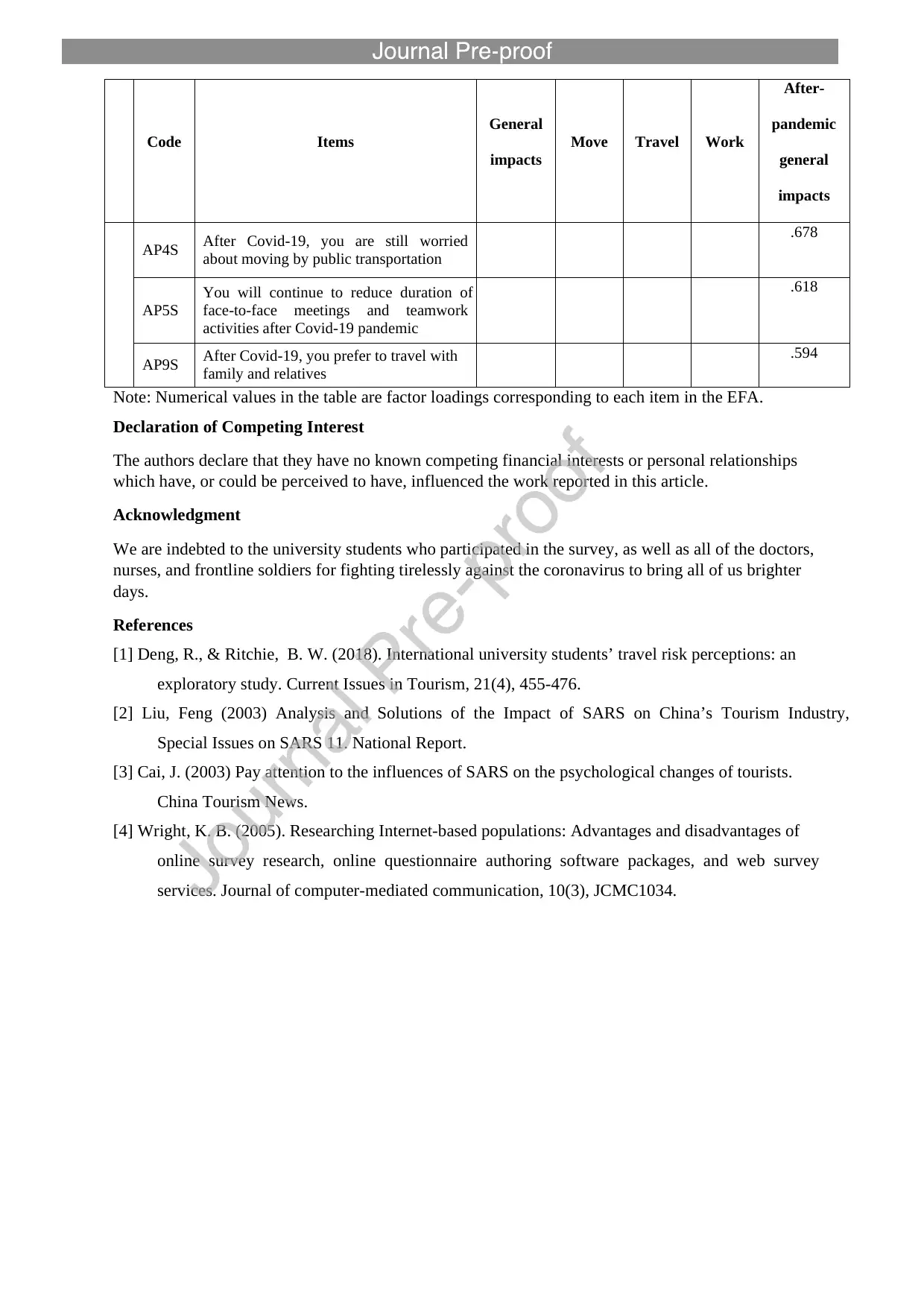
Code Items
General
impacts
Move Travel Work
After-
pandemic
general
impacts
AP4S After Covid-19, you are still worried
about moving by public transportation
.678
AP5S
You will continue to reduce duration of
face-to-face meetings and teamwork
activities after Covid-19 pandemic
.618
AP9S After Covid-19, you prefer to travel with
family and relatives
.594
Note: Numerical values in the table are factor loadings corresponding to each item in the EFA.
Declaration of Competing Interest
The authors declare that they have no known competing financial interests or personal relationships
which have, or could be perceived to have, influenced the work reported in this article.
Acknowledgment
We are indebted to the university students who participated in the survey, as well as all of the doctors,
nurses, and frontline soldiers for fighting tirelessly against the coronavirus to bring all of us brighter
days.
References
[1] Deng, R., & Ritchie, B. W. (2018). International university students’ travel risk perceptions: an
exploratory study. Current Issues in Tourism, 21(4), 455-476.
[2] Liu, Feng (2003) Analysis and Solutions of the Impact of SARS on China’s Tourism Industry,
Special Issues on SARS 11. National Report.
[3] Cai, J. (2003) Pay attention to the influences of SARS on the psychological changes of tourists.
China Tourism News.
[4] Wright, K. B. (2005). Researching Internet-based populations: Advantages and disadvantages of
online survey research, online questionnaire authoring software packages, and web survey
services. Journal of computer-mediated communication, 10(3), JCMC1034.
General
impacts
Move Travel Work
After-
pandemic
general
impacts
AP4S After Covid-19, you are still worried
about moving by public transportation
.678
AP5S
You will continue to reduce duration of
face-to-face meetings and teamwork
activities after Covid-19 pandemic
.618
AP9S After Covid-19, you prefer to travel with
family and relatives
.594
Note: Numerical values in the table are factor loadings corresponding to each item in the EFA.
Declaration of Competing Interest
The authors declare that they have no known competing financial interests or personal relationships
which have, or could be perceived to have, influenced the work reported in this article.
Acknowledgment
We are indebted to the university students who participated in the survey, as well as all of the doctors,
nurses, and frontline soldiers for fighting tirelessly against the coronavirus to bring all of us brighter
days.
References
[1] Deng, R., & Ritchie, B. W. (2018). International university students’ travel risk perceptions: an
exploratory study. Current Issues in Tourism, 21(4), 455-476.
[2] Liu, Feng (2003) Analysis and Solutions of the Impact of SARS on China’s Tourism Industry,
Special Issues on SARS 11. National Report.
[3] Cai, J. (2003) Pay attention to the influences of SARS on the psychological changes of tourists.
China Tourism News.
[4] Wright, K. B. (2005). Researching Internet-based populations: Advantages and disadvantages of
online survey research, online questionnaire authoring software packages, and web survey
services. Journal of computer-mediated communication, 10(3), JCMC1034.
1 out of 7
Your All-in-One AI-Powered Toolkit for Academic Success.
+13062052269
info@desklib.com
Available 24*7 on WhatsApp / Email
![[object Object]](/_next/static/media/star-bottom.7253800d.svg)
Unlock your academic potential
Copyright © 2020–2026 A2Z Services. All Rights Reserved. Developed and managed by ZUCOL.